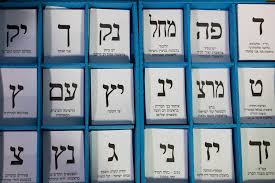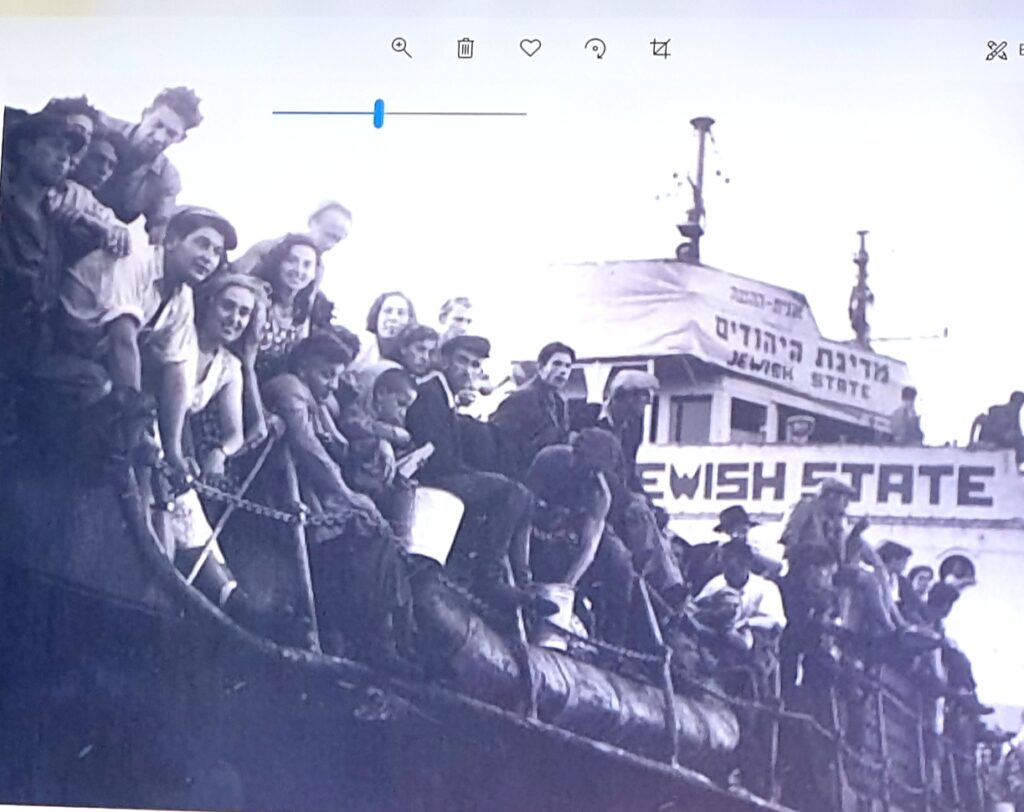“And Moses said to the people, “Do not be afraid. Stand still, and see the salvation of the Lord, which He will accomplish for you today. For the Egyptians whom you see today, you shall see again no more forever…” Exodus 14:13
“The LORD is a man of war…“Your right hand, O LORD, has become glorious in power; Your right hand, O LORD, has dashed the enemy in pieces.” Exodus 15:1, 6 (NKJ)

Picture from facebook: The title on this photo translated is: “With God’s help, there is going to be a great miracle”. The most repeated photographs of those who were kidnapped are of the red-headed boys of the Bibas family. Yarden and Shiri Bibas and their 9-month-old and 4-year-old sons Kfir and Ariel were kidnapped from their home on October 7th. They are still held hostage.
Choices and Decisions in Wartime
Educated at a top private school in England, the Britisher Alan Turing was considered a mathematics genius from an early age. He entered the University of Cambridge to study mathematics in 1931. He was already working part-time for the British Government’s Code and Cypher School before World War II with Germany broke out in September 1939. Turing then accepted a full-time, top-secret post at the British Army War-time Headquarters in Buckinghamshire, along with a team of other mathematical geniuses to head the development of a code-breaking machine that would decipher the military codes of the Enigma, the German devise used to encode strategic messages during the war.
After many unsuccessful tries, and very close to the deadline given by his employer, Turing’s machine was finally able to crack the German Enigma code just as the Germans planned to blow up a British war vessel with 500 hundred men on board. The team members were excited at the possibility of saving the men’s lives and hurried to make a phone call to inform headquarters of the good news. However, Turing grabbed the phone and said: “No, we are not going to disclose this breakthrough that would let the Germans know that we have decoded the Enigma. They will then destroy it and build another one. We must guard this secret even from our military.” All agreed except one whose brother was on board the vessel. He begged Turing to save his brother’s life. It was a difficult decision for Turing but with much determination, he declared that winning the war and saving millions of lives took precedence over saving a few hundred lives.
Subsequently, for the rest of the war, Turing’s machine supplied the Allies with large quantities of military intelligence. By early 1942, it had decoded monthly about 39,000 intercepted messages, a figure that rose to over 84,000 per month—two messages every minute, day and night. In 1942, Turing also devised the first systematic method for decoding messages encrypted by the sophisticated German cipher machine that the British called “Tunny.”
In the end, thanks to Turing, the war was shortened by two years, and about 14 million lives were saved.
A Similar Dilemma
In today’s war between Israel and Hamas, Israeli PM Netanyahu and the war cabinet now face a similar dilemma.
On October 7, 2023, on the last day of the holiday of Succoth, Hamas terrorists invaded southern Israel via land, air, and sea, committing atrocities upon residents in the entire region. During the massacre, the terrorists murdered in cold blood more than 1,200 innocent civilians, including infants, young and old, and youth who were partying at a peace music festival. Additionally, Hamas abducted 240 Israelis into the Gaza Strip.
It was a declaration of war that Israel has since been fighting. Israel has three main goals:
- destroying Hamas as a military and ruling force in Gaza;
- the return of the hostages; and
- ensuring Hamas will no longer threaten Israel’s security.
Israeli Prime Minister, Benjamin Netanyahu, vowed again a few days ago to continue the offensive war in the Gaza Strip until achieving a “crushing victory” against Hamas.
At the end of November 2023, a week’s ceasefire was declared. Hamas released 105 hostages and Israel freed 240 Palestinian prisoners and detainees. However, after Hamas violated the pause, the Israeli army resumed fighting. To date, there remain some 136 hostages, some alive and some murdered (the IDF has so far confirmed 31 hostages who have been killed, including the bodies of 2 soldiers kept by Hamas since 2014.)
Presently, Netanyahu refuses to accept another so-called “deal” with Hamas for the release of the remaining abducted Israelis, claiming that Hamas’ new conditions are unacceptable.
In protest, the families of Israeli hostages held in the Gaza Strip are protesting and have recently shut down a vital road in Tel Aviv to demand an immediate deal with Hamas for the release of their loved ones. On the other hand, thousands of Israeli right-wing demonstrators protested in Jerusalem and demanded the government not stop the fighting in Gaza, even for the negotiations with Hamas, which would result in Israel losing the war.
PM Benjamin Netanyahu is facing mounting public pressure, including from some politicians affiliated with his War Cabinet. However, Netanyahu is standing firm. He said at a news conference a few days ago: “Giving in to the outrageous demands of Hamas will not only fail to bring about the release of the hostages but will invite an additional massacre and disaster for Israel. The day after the war is the day after Hamas; not part of Hamas, not half of Hamas,” meaning ALL of Hamas. According to Netanyahu, the Israeli army is on the way to a complete victory that will take not years but months. “We will continue until the end,” he said, “There is no other solution besides complete victory.”
As Turing’s decision was in WWII to win the war and save millions at the cost of several hundred lives, so is Netanyahu’s decision to win the war and save the entire Jewish nation, unfortunately, at the cost, if necessary, of less than a hundred precious lives.
Our Prayer Focus
In this vein, we at the prayer tent are now meeting four times a week in prayer, supplication with thanksgiving, believing for a miracle, the release of the hostages, and complete victory over Israel’s vicious enemy. As with God’s miracle when He saved the people of Israel out of slavery in Egypt, when He parted the Red Sea and the Israelites crossed over on dry land and He then drowned the Egyptian army that pursued them. As the Lord said then to Israel: “the Egyptians you see today, you will see no more.” The enemy of Israel was completely destroyed, while Israel was saved.
We pray for a similar miracle today, for God to bring the Israeli hostages home safely, while Hamas is completely destroyed by the collapse of their own tunnels. Hamas in Gaza we will see no more. Amen!
News Flash
Monday we got the news that 2 hostages were rescued by the IDF in a daring mission in the southern Gaza Strip. Today is the 129th day of the war – and of their captivity. This is much-welcomed news and so encouraging. Please pray for more of the same.
Please Join Us in Prayer
- Please pray for Prime Minister Netanyahu – strength, health, divine guidance.
- Pray that the objectives of this war are accomplished.
- Pray that the objectives of the Lord concerning the salvation of souls will be accomplished.
- Pray for our soldiers, our hostages, and the many wounded, widowed, and orphaned by the war.
- Pray for the evacuees who are unable to return to their homes.
- Pray for those of us called to pray, that we will not grow weary but continue in strength to intercede as we see things unfolding.


